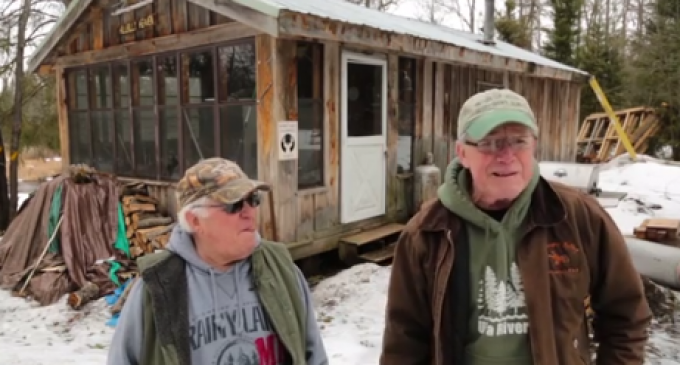
On the Upper Peninsula of Michigan in an area known as the Ottawa State Forest, a handful of families have been living there in cabins (affectionately referred to as “camps”) for generations. Back quite a few years ago, these people known collectively as Yuppers (for U-P or Upper Peninsula dwellers) built these cabins as vacationing spots initially, but over time which became permanent homes.
The largest natural feature in the area is the Ontonagon River which flows and feeds Lake Superior. For decades, the land in and around the river was owned by the Upper Peninsula Power Company (UPPCO) which provided hydroelectric power to a full two-thirds of the population of the UP.
Detroit Free Press has more:
Since the company had no real use for the land on either side of the river itself, UPPCO leased scattered 1-acre parcels to local residents who could not afford to buy their own property so they could build small cabins near the water, where there was good hunting, great fishing and beautiful scenery.
People built structures in all shapes and sizes, and gave them names like Bar None Lodge, Doe Haven, Altoon’s Alehouse, Da Troll Camp and Fuzzy’s No Road Condo. Most were bare-bones log cabins without power or running water. But they were solid camps that lasted for decades.
According to the report, the dams never materialized and the power company ended up selling the land back to the state. Twenty-five years ago, the federal government showed up and showed interest in the land. The state sold the land to the U.S. Parks Service, which then issued a notice to the camps that they would be given a grace period of 25 years to make arrangements to either move the homes or vacate them completely.
Reasons for this abandonment were not given, but it was assumed that the federal government had plans for the land. While the news was heartbreaking for the residents of these cabins who had literally spent their lives there, raising kids and passing on these residences through the generations.
All in all, the general pervading thought about the grace period was that maybe, just maybe, in twenty-five years the federal government would forget about them and just simply leave them alone.
In March of this year, the twenty-fifth anniversary of the notice by the federal government, U.S. Parks Service rangers appeared at their doors.

Burns, Oregon and Bundy’s Nevada all over again!!!
They are probably going to give to Muslims and build a new town, how terrible the our government would do this to law abiding citizens. If it had been illegals living there this would not have happened
Sheesh, they had so much time to save and buy thier own legal homes. Free rent for 25 years, what a good deal.
You did read where they leased the land… Right?
“National Parks” , “National Forests” are NOT Constitutional. Article I Section VIII Clause XVII of the Constitution says that the central government is only allowed to own land for military instillation and the 10 square miles that make up Washington DC. That’s it! However, if you look at a map of the land they “own” it is almost 1/3 of all the land in the US. NOT CONSTITUTIONAL!!!
The Jack booted thug Gestapo agents that did this and the authorizing authority should all be arrested and prosecuted!!!
The Parks Service takes what it wants, and gives little to nothing back. They did the same thing on the southern half of the Outer Banks of NC. Cape Lookout National Seashore they call it now. They boast about conservation, and creating an environment that will help people and nature better coexist. What a joke! The Cape Lookout National Seashore is dying place now. Erosion has almost completely washed away areas of the beach that were once tended to by locals who knew how to combat the situation. Sadly, the locals input doesn’t anymore. The Parks Service just ride around on their four wheelers watching it, and stopping long enough to scratch their heads where no solution exits, but as long as a turtle or oyster bird can fit on the beach they’re ok with what’s going on.
The Parks Service takes what it wants, and gives little to nothing back. They did the same thing on the southern half of the Outer Banks of NC. Cape Lookout National Seashore they call it now. They boast about conservation, and creating an environment that will help people and nature better coexist. What a joke! The Cape Lookout National Seashore is dying place now. Erosion has almost completely washed away areas of the beach that were once tended to by locals who knew how to combat the situation. Sadly, the locals input doesn’t matter anymore. The Parks Service just ride around on their four wheelers watching it happen, and stop long enough to scratch their heads where no solution exists. As long as a turtle or oyster bird can fit on the beach they’re ok with what’s going on though.
Typical of the government wasting tax money and man power which should have been directed at rounding up illegal aliens and deporting there sorry asses and the families left alone
These people were given a free ride for a very long time .The problem I see is they got to think they owned what they had . Just think of it as something that once was . As in once upon a time .
Not rare. Burning homes, decomisioned roads, and robbing states of their land. Parasitical Feds have no moral code. Every state would be feel maximum freedome and prosperity minus federal interferance.